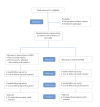Evaluating the Effectiveness of an Intervention Integrating Technology and In-Person Sexual Health Education for Adolescents (In the Know): Protocol for a Cluster Randomized Controlled Trial
- PMID: 32763885
- PMCID: PMC7442936
- DOI: 10.2196/18060
Evaluating the Effectiveness of an Intervention Integrating Technology and In-Person Sexual Health Education for Adolescents (In the Know): Protocol for a Cluster Randomized Controlled Trial
Abstract
Background: Access to a smartphone is nearly universal among American adolescents, and most of them have used the internet to seek health information. Integrating digital technologies into health program delivery may expand opportunities for youth to receive important health information, yet there are few rigorous studies assessing the effectiveness of this type of intervention.
Objective: The purpose of this study is to assess the effectiveness of In the Know (ITK), a program integrating in-person and technology-based sexual health education for underserved adolescents.
Methods: Youth were engaged in the development of the intervention, including the design of the digital technology and the curriculum content. The intervention focuses on 3 main areas: sexual health and contraceptive use, healthy relationships, and educational and career success. It includes an in-person, classroom component, along with a web-based component to complement and reinforce key content. A cluster randomized controlled trial is in progress among adolescents aged 13-19 years living in Fresno County, California. It is designed to examine the differences in self-reported health and behavioral outcomes among youth in the intervention and control groups at 3 and 9 months. Primary outcomes are condom and contraceptive use or no sex in the past 3 months and use of any clinical health services in the past 3 months. Secondary outcomes include the number of sexual partners in the past 3 months and knowledge of local clinical sexual health services. We will use mixed-effects linear and logistic regression models to assess differences between the intervention and control groups.
Results: Trial enrollment began in October 2017 and ended in March 2020 with a total of 1260 participants. The mean age of the participants is 15.73 (SD 1.83) years, and 69.98% (867/1239) of the participants report being Hispanic or Latino. Study results will be available in 2021.
Conclusions: ITK has the potential to improve contraceptive and clinic use among underserved youth. This trial will inform future youth-focused health interventions that are considering incorporating technology.
International registered report identifier (irrid): DERR1-10.2196/18060.
Keywords: United States; adolescents; mobile app; mobile phone; randomized controlled trial; sex education; sexual health; technology.
©Martha J. Decker, Abigail Gutmann-Gonzalez, Melisa Price, Julio Romero, Bhupendra Sheoran, Jennifer Yarger. Originally published in JMIR Research Protocols (http://www.researchprotocols.org), 07.08.2020.
Conflict of interest statement
Conflicts of Interest: None declared.
Figures
References
-
- Anderson M, Jiang J. Teens, Social Media & Technology 2018. Pew Research Center. 2018. May 31, [2018-08-15]. https://www.pewresearch.org/internet/2018/05/31/teens-social-media-techn...
-
- Wartella E, Rideout V, Montague H, Beaudoin-Ryan L, Lauricella A. Teens, health and technology: a national survey. Media Commun. 2016 Jun 16;4(3):13. doi: 10.17645/mac.v4i3.515. - DOI
-
- Mitchell KJ, Ybarra ML, Korchmaros JD, Kosciw JG. Accessing sexual health information online: use, motivations and consequences for youth with different sexual orientations. Health Educ Res. 2014 Feb;29(1):147–57. doi: 10.1093/her/cyt071. http://europepmc.org/abstract/MED/23861481 - DOI - PMC - PubMed
-
- Zhao J, Freeman B, Li M. Can mobile phone apps influence people's health behavior change? An evidence review. J Med Internet Res. 2016 Oct 31;18(11):e287. doi: 10.2196/jmir.5692. https://www.jmir.org/2016/11/e287/ - DOI - PMC - PubMed
-
- Payne HE, Lister C, West JH, Bernhardt JM. Behavioral functionality of mobile apps in health interventions: a systematic review of the literature. JMIR Mhealth Uhealth. 2015 Feb 26;3(1):e20. doi: 10.2196/mhealth.3335. https://mhealth.jmir.org/2015/1/e20/ - DOI - PMC - PubMed
LinkOut - more resources
Full Text Sources
Miscellaneous



